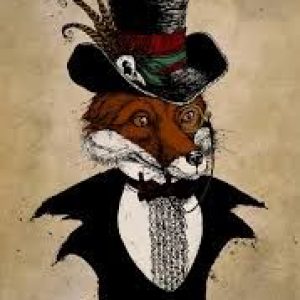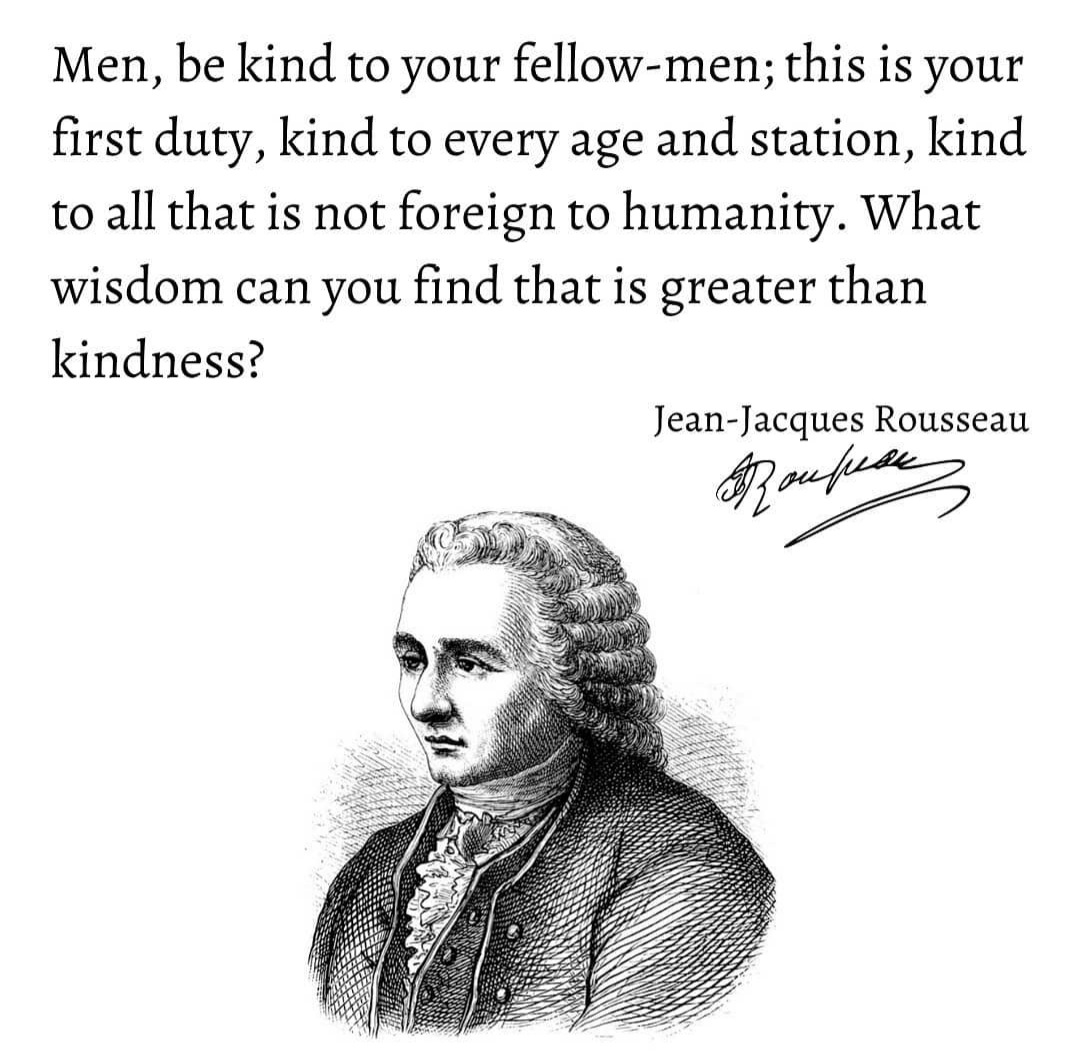
Berlin’s field was political and moral philosophy, but he did not think of himself as a philosopher standing in the line of succession from Locke and Rousseau and Mill. Rather, he studied the ideas of those thinkers like an epidemiologist tracing the path of a disease back to the source. Berlin was, in short, a historian of ideas, or, as he came to think of himself, a historian of philosophy. He did not deliver a comprehensive statement of his own views until 1952, when he delivered a series of lectures on Enlightenment and Romantic thinkers…Berlin’s point: the heroic idealism of the Romantic era had offered a blueprint, and a banner, for modern tyrants.
…In the second lecture, on Rousseau…[Berlin] explained that, like a mathematician who has cut the knot of an ancient conundrum, Rousseau solved, or believed he had solved, the apparently intrinsic tension between liberty and authority, or legitimate power. Rousseau viewed both values as absolute: individual liberty was inalienable, but so, too, were the moral rules that govern right behavior and thus must govern society. Must one, then, continually adjust the dial between these two poles, as previous thinkers had supposed? Not at all. Both were absolute. However, Rousseau insisted, a rational man would never will for himself what was at variance with the “general will.” If he did, it was not his true, natural self speaking but the self corrupted by the artifice, the pervasive falseness, of society. In a just society, liberty and authority would be fully harmonized. By this strange turn of logic, Berlin went on, Rousseau, the champion of liberty who helped inspire the French Revolution, ended up betraying the idea of liberty — just as the Revolution itself did. Berlin was hardly the first thinker to lodge this allegation; so, too, had Constant. But Berlin demonstrated the link between the apparently noble principle of the general will and the slave ideology of Lenin and Stalin in a way that no listener in 1952 could have missed:
You want to give people unlimited liberty, because otherwise they cease to be men; and yet at the same time you want them to live according to the rules. If they can be made to love the rules, then they will want the rules, not so much because the rules are rules as because they love them…So Rousseau says, “Man is born free, and yet he is everywhere in chains.” What sort of chains?…If the chains are simply rules the very obedience to which is the most free, the strongest, the most spontaneous expression of your own inner nature, then the chains no longer bind you — since self-control is not control. Self-control is freedom.
In these lectures Berlin asked how liberty, the greatest of all political values, comes to be perverted into its opposite….The grain of totalitarianism is planted when we say that we can achieve all our goals through a single formula, that we can enjoy, as Rousseau insisted, absolute liberty even amidst absolute authority. Modern man, beset by agoraphobia, as Berlin put it, is drawn to the promise of an effortless resolution. The total system is beautiful and sleek, precisely because it is total. But of course it is false, for all good things do not, in fact, go together. We must choose among competing goods — so much liberty, so much equality, so much justice, and so on. There is no “right” choice; each of us will have different preferences. A liberal society does not tell us what we should wish but honors the variety of wishes. Mill remained a hero to Berlin throughout his life, in part because Mill understood the moral importance of variety — of pluralism. He defended the right of every individual to act and think according to his or her own particular and even peculiar nature. Because, Berlin wrote, Mill’s view of human nature accepts individuals’ “perpetual incompleteness, self-transformation and novelty, his words are today alive and relevant to our own problems.”
…One kind of liberty had been enough for John Stuart Mill, but in the twentieth century a new and, Berlin thought, insidious understanding of freedom had gained a powerful purchase in people’s minds. Today, Berlin said, an “open war” is being fought between “two systems of ideas” — liberalism and communism — founded on two very different understandings of what it means to be free.
Berlin began by observing that all classical liberal thinkers have understood liberty as freedom from coercion. He called this doctrine “negative liberty” because it defines the sphere within which no external obligation may be imposed on an individual. For Berlin, as for Mill, political thinking began with the autonomy, and thus the sanctity, of the person. Indeed, in his essay “John Stuart Mill and the Ends of Life,” Berlin observed that, despite Mill’s dutiful effort in On Liberty to provide a utilitarian justification for maximum individual freedom, he plainly regarded liberty as a good in itself. People have different tastes, wishes, ideas, temperaments; the great fact of human life is not uniformity but diversity. To deprive people of their freedom to speak and behave as they wish is to deny them the fullness of their individuality. Berlin…wrote that liberal thinkers naturally disagree on the scope and nature of Mill’s inviolable sphere of private thought and action, but the minimum must be understood as “that which a man cannot give up without offending against the essence of his human nature.”
But here Berlin made a striking observation: Mill, he said, has confused two different ideas. The idea of coercion is bad and liberty good is logically distinct from Mill’s belief that individuals in conditions of liberty will be able to fully realize their own gifts and that a society marked by a commitment to freedom will reach the greatest heights of which humans are capable. The “fiery individualism” Mill held out as an affirmative good often emerged from highly disciplined societies, like the Scottish Puritans, that routinely and intentionally infringed on the sphere of private speech and behavior. Negative liberty, in turn, may flourish in the absence of the kind of self-government that Mill thought of as the end point of a truly liberal society; one need only think of the despot who leaves his subjects alone so long as they obey. The liberal wish for private space and the accompanying vision of human and social self-realization are not only not the same thing, but they may conflict with one another. One, Berlin wrote, is “freedom from” — that is, freedom from coercion — while the other is “freedom to” — that is, to lead a certain kind of life. It is this freedom that Berlin described as “positive liberty.”
…The latter, [Berlin] wrote, springs from the classically liberal “wish on the part of the individual to be his own master.” What’s more, negative liberty, by itself, offers no guidance on how to shape a better life, not only for oneself but for one’s fellow man. Many liberals, Berlin observed, feel beleaguered and at times tormented by the conclusion that their liberty has been purchased at the cost of the suffering of others — through, for example, an unjust economic order. They, therefore, insist on the kinds of large-scale social changes that would lead to “equality of liberty.” [George] Orwell, for example, thought just this way. Berlin accepted that such principles may well constitute “the foundations of liberal morality.” But, he added, crucially, they should not be described as aspects of liberty. If you sacrifice some of your freedom, or society’s freedom, in the name of some other good, you may well have produced more fairness or justice or common decency, but you have diminished the stock of liberty.
This sounds very much like a linguistic quibble. Why is it so important to prevent the misuse of “liberty”?…Berlin’s answer is that totalitarianism has learned to speak the language of liberty, and one must distinguish between true and specious uses of this beguiling word…If one says, as Rousseau did, that, whatever you may think you want, your true self, your rational self, must want to live in accordance with this or that set of principles, then you must put aside your puny wishes. [Johann Gottlieb] Fichte took this dangerous claim one step further by insisting that the individual discovers the highest form of self-realization by submitting to the will of the group, itself the embodiment of true freedom. “Once I take this view,” Berlin concluded, “I am in a position to ignore the actual wishes of men or societies, to bully, oppress, torture them in the name, and on the behalf, of their ‘real’ selves.”
…[F]ascism and communism also posed a dire threat to something so elemental to society that political thinkers of earlier generations had barely needed to take account of it: the very idea of truth. In Darkness at Noon, the 1940 novel that exposed the reality of the Soviet show trials, Arthur Koestler furnished a terrifying picture of a society based on slogans universally understood to be grotesque lies. The struggle to vindicate liberal principles had to be waged not only on political or economic lines but on cognitive ones as well. This conviction lay at the core of Karl Popper’s idea that the “open society” depended above all on the preservation of the spirit of scientific inquiry.
The great prophet on the totalitarian assault on truth was, of course, George Orwell, who first came to recognize the danger during the Spanish Civil War, when he saw that the newspapers of all sides described events that bore no relation to reality. In an unpublished essay apparently written in 1942, he recalled having said to Koestler, “History stopped in 1936” — the year of the Soviet show trials. Thereafter one would never know what was true and what had been fabricated. The experience, Orwell wrote, had left him with the feeling that “the very concept of objective truth is fading out of the world.” This fear came more and more to preoccupy Orwell. In 1947 he wrote that because totalitarian regimes insist that the leadership is infallible, history must be perpetually rewritten in order to eliminate evidence of past mistakes. Totalitarianism thus “demands a disbelief in the very existence of objective truth.” Orwell added darkly that “to be corrupted by totalitarianism one does not have to live in a totalitarian country”; one simply had to surrender to certain habits of thought.
…Like Berlin, Popper looked to reason to counter the pull of the tribal, the magical, the extrahuman. Rationalism, Popper wrote, “is an attitude of readiness to listen to critical arguments and to learn from experience. It is fundamentally an attitude of admitting that ‘I may be wrong and you may be right, and by an effort, we may get nearer to the truth.'” The irrational certitudes of Hitler and Stalin, the incantatory logic that hypnotized whole populations, turned rational skepticism into the sword and shield of liberalism. In his 1947 essay “Philosophy and Politics,” the philosopher Bertrand Russell asserted that “the essence of the liberal outlook lies not in what opinions are held, but in how they are held: instead of being held dogmatically, they are held tentatively, and with a consciousness that new evidence may at any moment lead to their abandonment.”
The full book can be purchased here.



